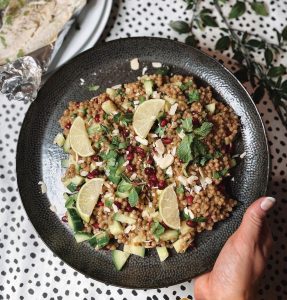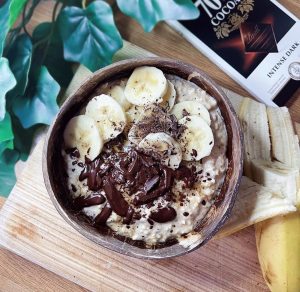The Importance Of Carbohydrates
By Nutritionist Jess Bloom


Everyone’s favourite person to blame – CARBS. How many times has the average person heard someone talking about their new ‘low carb diet’? Too many times! Let’s divulge and bust this myth for good.
So, what are carbohydrates? Carbohydrates are one of the 3 macronutrients (alongside protein and fats) carbohydrates provide 4 calories of energy per gram or around 16.8 kilojoules and are the preferred source of energy for your brain and higher intensity activities such as weightlifting and sprinting. On consumption, all digestible carbohydrates are broken down into glucose. There are 3 different types of carbohydrates. We have simple carbs (think simple sugars and fruit) complex carbs (think starches like rice, bread, and pasta) and fibre (think beans, legumes, whole grains and veggies).
So WHY would you feel the need to restrict carbohydrates from your diet? The most common reason is because for every 1 gram of carbs we consume, we hold around 3 grams of water (perfectly normal, hence the word carboHYDRATE) so when somebody cuts out carbs for a week, they step on the scale and they’ve lost 7 pounds in a week, this is not body fat loss, it’s just water, as soon as they have a banana, they will hold the water again!
If your goal is fat loss there is no need to restrict any macronutrient from your diet, you need to adhere to an overall calorie deficit in order to elicit fat loss and that should be with a diet including a harmonious balance of all food groups. If you don’t have adequate carbohydrates in your diet you will miss out on all of the vital nutrients and the vitamins and minerals within fruits and vegetables, these are even more vital for an active individual and although these vitamins and minerals don’t contain any meaningful energy themselves, they allow your body to unlock energy within the macronutrients and also act as biological catalysts in the myriad reactions that occur in your body. A diet that is lacking in vitamins and minerals results in feeling extremely ‘sluggish’ as well as slowing down other systems in the body. For example, it is common knowledge that vitamin C can help you ward off a cold. This is because vitamin C plays an important role in immune system function. Ironically, many people only worry about their vitamin C intake when they actually get a cold, by which time it’s too late!
So, whether you’re strength training, running or just generally have a busy active lifestyle, I think we’ve covered the important role that carbohydrates play in a diet. But how much? I hear you cry. And what are the best sources of carbohydrates to include in your diet?
Of course, everyone is different and as an online coach I take many things into account when calculating an individual’s calories and macros, from the obvious factors like height, weight, age, gender, to less obvious factors like hormones and dieting history. But as a general rule of thumb, I would generally advise around 40% of your diet should be made up of carbohydrates. Ideally this would include things like, all vegetables, all fruits, whole grains like rice and bread, and good sources of fibre like beans, legumes, nuts, seeds (the fruits and veggies come under the fibre bracket also) ideally the more colour, the better! That doesn’t mean we should cut out the refined sugars completely – but it’s just important to be aware that if you were to compare 500 calories of sweets compared to 500 calories of a vegetable soup, although they are both carbohydrates, the sweets will be a lot less satiating, and will provide you with an immediate ‘sugar high’ (followed by a swift ‘sugar crash’) as the simple sugars are absorbed into the blood stream much quicker compared to the complex carbs and fibre sources which will offer a slower release of energy and a much more balanced blood sugar level.
So how about some examples?
Let’s say you’re off to the gym at 11am. I would suggest having a good source of protein and carbs around 60 – 90 minutes prior, perhaps your classic scrambled eggs (protein) on toast (carbs). Or a bowl of Greek yoghurt (protein) with fruit (carbs) or maybe a bowl of porridge and fruit (carbs) with a scoop of whey protein. This should give you the energy you require for your session, and then it’s important to refuel afterwards with a good source of protein, and then refuel your glycogen stores (your carbohydrate stores) throughout the day. So perhaps you finish your session at 12, at 1pm you have lunch, this could be a big tuna salad (protein and carbs) or chicken (protein) with rice and veggies (carbs) or a tofu wrap (protein and carbs).


If you take one thing away from this article, let it be that you don’t need to cut any specific foods or food group out of your diet to reach any type of physique-based goal. It’s important to align your lifestyle with your goals in a sustainable enjoyable way so that you can adhere to it long term. For me? Carbs are my best friend, I love fueling my body with the energy it needs…plus carbs taste amazing, let’s call a spade a spade.
Next time you hear someone down the pub talking about their ‘new keto diet’ – feel free to enlighten them with some of these facts! More fool them I say!
Jess x










